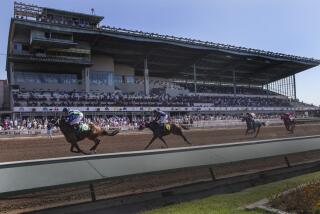Equus Mini Sets Pace Like None Other at Los Alamitos Track
- Share via
Her name, literally, means “little horse.” And no four-footed performer on the Los Alamitos backstretch is so aptly titled.
Rarely has one so small accomplished so much in as short a period of time as Equus Mini, a pony-sized pacing mare who regularly has put the screws to her bigger, stronger opponents the past several weeks.
At less than 14 hands in height and weighing a bit more than 700 pounds, Equus Mini doesn’t figure to command respect when on the track versus horses of “normal” dimensions, to whom she spots several inches and hundreds of pounds.
But this four-year-old mare--yes, she’s full grown--is no 97 pound weakling of the horsey set. In fact, when it comes to kicking dirt into faces, Equus Mini has been doing the kicking recently.
Enroute to winning, that is.
Equus Mini is not the most talented pacer on the grounds, but logic requires admission that none try harder. Certainly, contrasting her size with that of the hundreds of other pacers and trotters populating the Los Alamitos barn area, her vital organ figures to be a greater percentage of body weight than anyone else’s.
The cliche of a racehorse being all heart is entirely appropriate this time. Overseeing the little one during her season of big performances is owner-trainer Don Koenig, who thanks to “Mini’s” efforts has a phenomenal training percentage this season with less than a month to go in the meeting.
Hoenig, 36, has nine horses on the Los Alamitos backside, and has had good ones in the past ll years of training. “I’ve had better horses,” he confirms when speaking of Equus Mini. “But none that have been more fun.”
As is often the case in racing, the enjoyment wasn’t planned. Koenig privately purchased the then-filly last summer, then took her and several other horses to Cloverdale, a track in British Columbia just across the Washington state border.
Did he take them to race for good purses? To try a new track surface or a softer circuit?
“I took horses up there to sell them,” he says. “Our business wasn’t much good down here and I hoped to turn over some horses up there before coming back down for the next season.”
Koenig succeeded in selling two horses, but one of those with a price on its head that went wanting was Equus Mini. At $8,000, none of the Cloverdale horsemen wanted this tiny pacer taking up a fuIl stall.
“She didn’t race real well up there, either,” Koenig recalls, “The track is much deeper up there and it rains a lot, and she came down with a heel infection. It was nothing serious, and she could race, but she was a little run down and it showed in her races.”
So back to California came Koenig and “Mini”. A California-bred, she was eligible to the restricted California Platinum Series late in 1989 at Los Alamitos. But an episode of breaking stride before the start of one race required her to re-qualify, and she missed the $20,000 series final.
Such opportunities for big money are limited out West for standardbreds, but Hoenig remains philosophical. “She didn’t like the bit I had on her, and that’s all there was to it, Some horses are like that.”
Her growth already stunted, Equus Mini now had to be re-schooled. “I experimented some in training, and finally found the right combination.” Koenig says. She was ready to begin her 1990 season in earnest January 23.
The magic wasn’t immediate. “Mini” raced herself into shape with a third and pair of fourths, going off at 222-1 on one occasion. More promising was her final quarter mile time of under 30 seconds each start. But February 9 found a diminutive mare in the Los Alamitos winners’ circle after polishing off the final 440 yards in a brisk 29 seconds. She came back a week later to win again, this time in a career-best 1:58 1/5 for the mile. Seven nights later, again using a strong late kick, her little body pulled the bike and driver James Lackey from well off the lead to another triumph. After a late bid produced a second-place finish in her next race, Equus Mini and Lackey combined for yet another tally March 9 to complete a four-win cycle that began 28 nights earlier.
She has earned more than $12,000 already this year.
Her March 9 triumph was significant in that she raced for an extended time on the outside “without cover,” that is, there was no horse immediately in front of her to take the wind as the field moved around the track. Few horses win with such a journey, but Equus Mini refused to fold in the final eighth of a mile and kept her short legs moving until she posed for a winners’ circle snapshot.
Racing without cover? To fans at the track that night, she certainly was covered. She was, in fact, completely hidden. When Equus Mini races on the outside of a rival--any rival--on the backstretch, she cannot be seen from the grandstand. Not until she takes the lead is she in plain sight.
And she has been stepping out on her own, in front, quite a bit lately, as if doing it for all the undersized competitors in the equine world.
More to Read
Go beyond the scoreboard
Get the latest on L.A.'s teams in the daily Sports Report newsletter.
You may occasionally receive promotional content from the Los Angeles Times.










